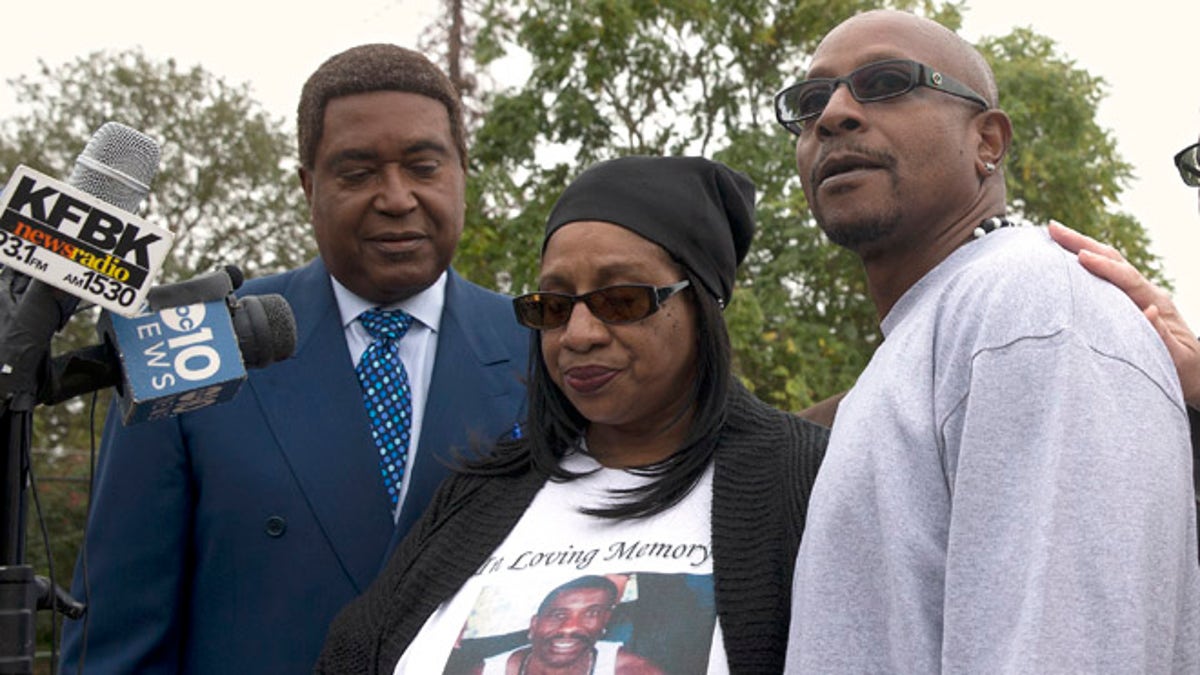
Robert Mann, right, the brother of Joseph Mann, who was killed by Sacramento Police in July, discusses the shooting of his brother during a news conference Monday, Oct. 3, 2016, in Sacramento, Calif. Mann, accompanied by his sister, Deborah, center, and attorney John Burris are demanding that the officers involved in shooting of Joseph Mann, 50, be charged with murder and that the U.S. Department of Justice open a civil rights investigation of the Sacramento Police Department. (AP Photo/Rich Pedroncelli) (Copyright 2016 The Associated Press. All rights reserved.)
SACRAMENTO, Calif. (AP) – An attorney representing two Sacramento, California, police officers said that they faced a "terrifying situation" with a mentally disturbed man on drugs and acted reasonably when they made a split-second decision to shoot the knife-wielding man in July.
Legal experts, meanwhile, said a dashboard camera recording of the two officers discussing hitting Joseph Mann with their police car before appearing to try to run him down does not make it more likely that they will face criminal charges in the shooting.
Officers John Tennis and Randy Lozoya were trying to knock down the 50-year-old black man with their patrol car, not kill him, attorney Judith Odbert said in a lengthy written statement Tuesday.
The officers can be heard on the recording saying, "I'm gonna hit him" and "OK, go for it" before appearing to drive their cruiser twice at Mann, who managed to scramble out of its way both times. The officers then stopped the cruiser, got out and pursued Mann on foot.
Odbert said the officers hoped "to take the subject off his feet to prevent the need for any other force to be deployed," the statement said.
When that didn't work, the two officers left their vehicle and shot Mann 14 times.
Odbert said Mann was "throwing items at them, he was intentionally defiant and moving aggressively towards officers with his weapon."
"Mr. Mann was not an unarmed black male minding his own business and shot for racial reasons," she wrote.
Mann's relatives have called for a federal civil rights investigation and said the two officers should be charged with murder.
John Burris, an attorney for the family, said Odbert's account directly contradicts what video recordings show about the incident.
"She must be blind," Burris said. "The videotape clearly shows that he was standing still and pointing in the direction of the officers and they ran up on him without any escalation."
"Regardless of what they think or said this shooting was unjustified," Burris said.
He previously said Tennis and Lozoya acted like "big game hunters closing in on an animal."
Odbert called Burris' allegations that the officers set out to kill Mann "character assassination" and said the officers acted because they feared Mann was moving toward an area with more people.
The attorney also said the officers are not racist. Tennis is white and Lozoya is Latino, and both have mixed-race children, she said. She said the two Sacramento officers have received lifesaving and valor awards, and that Tennis once ran into a burning building to rescue occupants.
Prosecutors will have to evaluate the use of the police car and subsequent shooting to determine whether force was justified in each case, said Philip Stinson, an associate professor in the criminal justice program at Bowling Green State University in Ohio.
The officers may have reasonably feared for their lives or public safety, justifying any decision to use their vehicle to hit the man, he said.
"If you and I mowed somebody over, prosecutors would start with the assumption it was murder or manslaughter and work back from there," he said. "With a police officer, the assumption they start with is, 'Was this a justified use of deadly force?'"
A 911 caller initially reported that Mann appeared to have a gun, and Odbert said that made it a more dangerous situation.
Police found a knife but no gun after Mann was killed.
"It's ugly, but it's not necessarily illegal," Jonathan Blanks, a researcher at the Cato Institute who studies police prosecutions, said about the attempt to use the police vehicle to stop Mann. "At the heat of the moment, you're angered, your adrenaline's going up, if you think this guy is a danger you're not going to necessarily go in there with kid gloves."
Blanks pointed to a case in Arizona last year in which a police officer rammed an armed suspect who police say had embarked on a daylong crime spree before stealing a rifle and shooting it in the air near businesses. The encounter was also captured on a dashboard camera.
An internal review by the Marana Police Department just north of Tucson found that Officer Michael Rapiejko acted swiftly and correctly, and prosecutors declined to charge him.
Prosecutors rarely file charges against police officers in part because legal rulings have given police leeway in the use of lethal force, Blanks said.
When prosecutors do file charges, officers are rarely convicted.
"Police officers have a hero's halo in the minds of many Americans," said Jody Armour, a criminal law professor at the University of Southern California Gould School of Law.
In the Sacramento case, Armour said officers could plausibly argue they thought the suspect had a gun, so they used their vehicles to protect themselves and the public.
